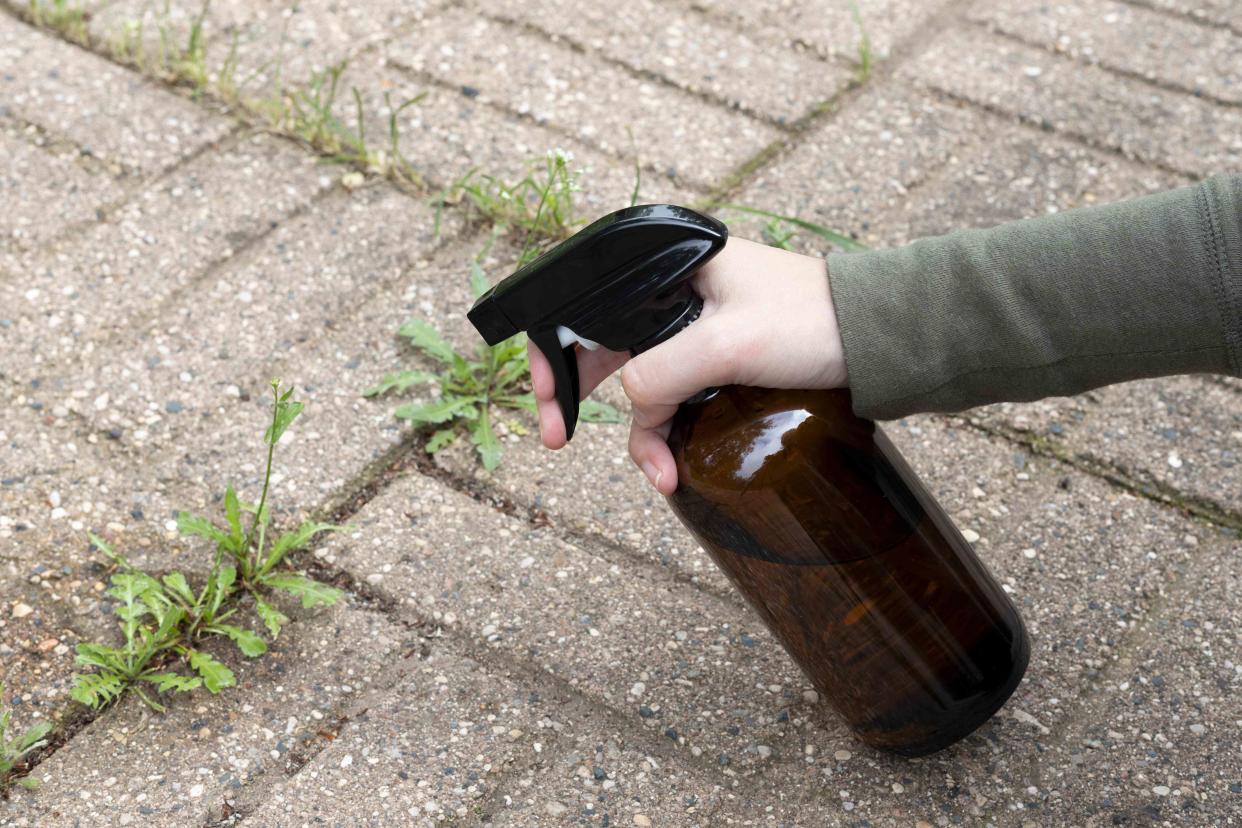Baking Soda Makes a Great DIY Weed Killer—Here's How to Use It

The Spruce / Nelly Cuanalo
Baking soda is a good solution for killing weeds in certain cases. This common household product will kill all small types of weeds. You can also use it to control powdery mildew, a fungal disease that affects beloved landscape plants such as rose bushes and lilac shrubs.
Baking soda weed killer is easy to use, whether you are applying it straight out of the box or preparing a solution with it to spray on the targeted weeds.
Learn why baking soda works as a weed killer, how to use it, and what its limitations are.
Where to Use Baking Soda
Baking soda is a non-selective herbicide, so unfortunately it could kill small plants and grass. Use it on isolated weeds, like in between pavers, along the edge of the driveway, or in sidewalk cracks.
Why Baking Soda Works on Weeds
The reason baking soda is effective in killing weeds is that one of its major ingredients is salt. In sufficient quantities, salt's effect on plants is to dehydrate them.
If you want to kill a weed permanently, this is one way to do it: dry it out so much that it can't take up water anymore, and the weed will die for good.
Although it takes a higher dosage of baking soda to kill a larger plant (such as a shrub), it's still advisable to apply baking soda cautiously to shrub foliage when using it to control powdery mildew. When mixing your solution, use one tablespoon of baking soda per 1 gallon of water.
Want more gardening tips? Sign up for our free gardening newsletter for our best-growing tips, troubleshooting hacks, and more!
How to Use Baking Soda to Kill Weeds
There are two different ways to apply baking soda to kill weeds. The easiest way is to pour it right out of the box, directly onto the weeds (approximately 1 teaspoon for each weed). Wet the foliage first so that the baking soda sticks to the leaves.
Alternatively (and better), prepare a solution of baking soda and water, pour some of the solution into a spray bottle, and spray the weeds. When using a sprayer bottle, it's easier to target the weeds. This method prevents the baking soda from blowing away (which is a major drawback of the direct-application method).
Whichever method you use, choose a sunny day to apply the baking soda (rain would wash it off before it had a chance to work). To mix and apply a baking soda and water solution:
Add 10 tablespoons of baking soda to a gallon of water.
Shake it to dissolve the baking soda.
Pour some of the solution into a sprayer bottle.
5 Additional Tips for Killing Weeds Naturally
In addition to using baking soda, there are many other ways to kill weeds naturally.
Using vinegar: Vinegar is another natural herbicide. For best results, use vinegar that is higher in acetic acid.
Using boiling water: This is the cheapest way to kill weeds naturally. However, as with vinegar, remember that it is non-selective.
Smothering: You can also smother weeds with black plastic, tarps, etc. This option is ideal for a landscape area where a vigorous weed has taken over, forming a monoculture. For example, use tarps to smother a stand of Japanese knotweed.
Hand-pulling weeds: This is such an obvious method that it's easy to overlook. Many gardeners enjoy getting down into the dirt and coming into contact with plants, even if they're weeds.
Using salt: As an alternative to baking soda, you can use salt to kill weeds (since it is the salt in baking soda that makes it an effective herbicide). It may be a more sensible solution, as salt is cheaper.
Frequently Asked Questions
Does baking soda kill weeds permanently?
Yes, because plants must take up water to live, and baking soda prevents them from doing this.
Does baking soda kill weeds between pavers?
Yes. In fact, this is one of the best uses for baking soda weed killer. It isn't effective on lawns, for example, because it would kill the grass.
Will baking soda kill plants and grass?
Yes. Baking soda weed killer is a non-selective herbicide. It kills plants and grass, too, not just weeds.
Read the original article on The Spruce.

